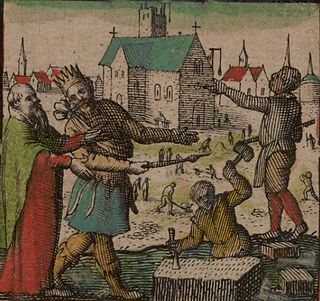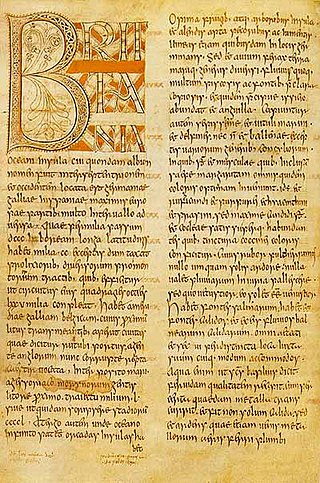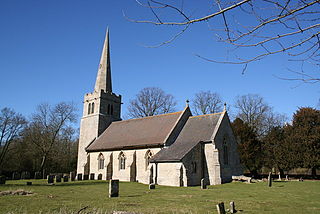See also
- Bédé, Bande dessinée French comics
- St Bede's Church
Bede may refer to
Canada;
Alfred of Beverley was an English chronicler, and sacrist of the collegiate church of St John the Evangelist and St John of Beverley wrote a history of Britain and England in nine chapters from its supposed foundation by the Trojan Brutus, down to the death of Henry I in 1135. Alfred's chief sources, in addition to Bede's Historia Ecclesiastica de Gentis Anglorum, are Geoffrey of Monmouth's Historia Regum Britanniae, Henry of Huntingdon's Historia Anglorum, The Chronicle of John of Worcester, and the Historia Regum, attributed to Symeon of Durham.

Bede, also known as Saint Bede, the Venerable Bede, and Bede the Venerable, was an English monk, author and scholar. He was one of the greatest teachers and writers during the Early Middle Ages, and his most famous work, Ecclesiastical History of the English People, gained him the title "The Father of English History". He served at the monastery of St Peter and its companion monastery of St Paul in the Kingdom of Northumbria of the Angles.

Sæberht, Saberht or Sæbert was an Anglo-Saxon King of Essex, in succession of his father King Sledd. He is known as the first East Saxon king to have been converted to Christianity.

The Ecclesiastical History of the English People, written by Bede in about AD 731, is a history of the Christian Churches in England, and of England generally; its main focus is on the conflict between the pre-Schism Roman Rite and Celtic Christianity. It was composed in Latin, and is believed to have been completed in 731 when Bede was approximately 59 years old. It is considered one of the most important original references on Anglo-Saxon history, and according to some scholars has played a key role in the development of an English national identity.
Ecgberht was an Anglo-Saxon monk of Northumbria. After studying at Lindisfarne and Rath Melsigi, he spent his life travelling among monasteries in northern Britain and around the Irish Sea. He was instrumental in the establishment of Wihtberht's mission to Frisia.

The Saint Petersburg Bede, formerly known as the Leningrad Bede, is an Anglo-Saxon illuminated manuscript, a near-contemporary version of Bede's 8th century history, the Historia ecclesiastica gentis Anglorum. Although not heavily illuminated, it is famous for containing the earliest historiated initial in European illumination. It is so named because it was taken to the Russian National Library of Saint Petersburg in Russia at the time of the French Revolution, by Peter P. Dubrovsky.
Aldwyn is an Anglo-Saxon saint. The village of Coln St Aldwyn in Gloucestershire is generally supposed to be named after him.

Anglo-Saxon missionaries were instrumental in the spread of Christianity in the Frankish Empire during the 8th century, continuing the work of Hiberno-Scottish missionaries which had been spreading Celtic Christianity across the Frankish Empire as well as in Scotland and Anglo-Saxon England itself during the 6th century. Both Ecgberht of Ripon and Ecgbert of York were instrumental in the Anglo-Saxon mission. The first organized the early missionary efforts of Wihtberht, Willibrord, and others; while many of the later missioners made their early studies at York.
Saint Ceolwulf was King of Northumbria from 729 until 737, except for a short period in 731 or 732 when he was briefly deposed and then restored to power. Ceolwulf ultimately abdicated and entered the monastery at Lindisfarne. He was the "most glorious king" to whom Bede dedicated his Historia ecclesiastica gentis Anglorum.

The Moore Bede is an early manuscript of Bede's 8th-century Historia ecclesiastica gentis Anglorum. It was formerly owned by Bishop John Moore (1646–1714), whose collection of books and manuscripts was purchased by George I and donated to Cambridge University.

Saint Hybald, also known as Higbald, Hibald or Hygbald, was a 7th-century Anglo-Saxon saint. His feastdays are 18 September and 14 December (Orthodox).
Bifus or Bisi was a medieval Bishop of the East Angles.
Hartlepool Abbey, also known as Heretu Abbey, Hereteu Abbey, Heorthu Abbey or Herutey Abbey, was a Northumbrian monastery founded in 640 CE by Hieu, the first of the saintly recluses of Northumbria, and Aidan of Lindisfarne, on the Headland Estate of Hartlepool now called the Heugh or Old Hartlepool, in County Durham, England.
The Synod of Twyford was a synod of the early English church held in 684 and described by Bede in his Historia ecclesiastica gentis Anglorum, Book IV, ch. 28.

The literature of England is literature written in what is now England, or by English writers. It consists mainly of English literature - i.e. literature written in the English language - but there are important examples of literature from England written in other languages.

Peter Petrovich Dubrovsky, was a Russian bibliophile, diplomat, paleographer, secretary of the Russian Embassy in France, collector of manuscripts and books. Throughout his life he collected about 2000 manuscripts. Between 1805 and 1812 he worked at the Imperial Public Library.
John Smith (1659–1715) was an English cleric, known for his edition of the Historia ecclesiastica gentis Anglorum of Bede.

thumb

Rowley Burn is a stream in Northumberland, running around three miles south of Hexham before joining the Devil's Water, which flows into the River Tyne.